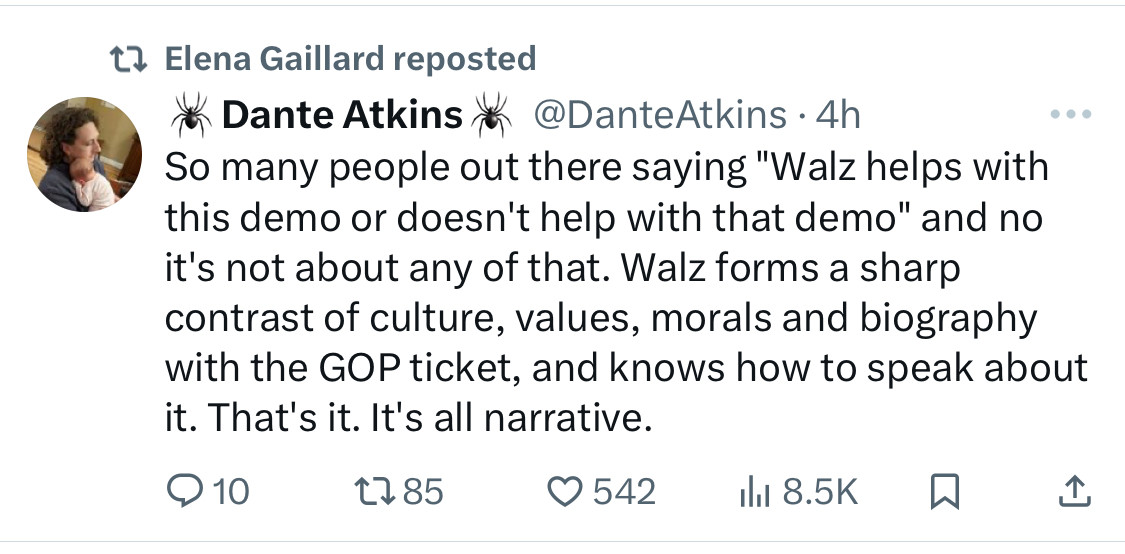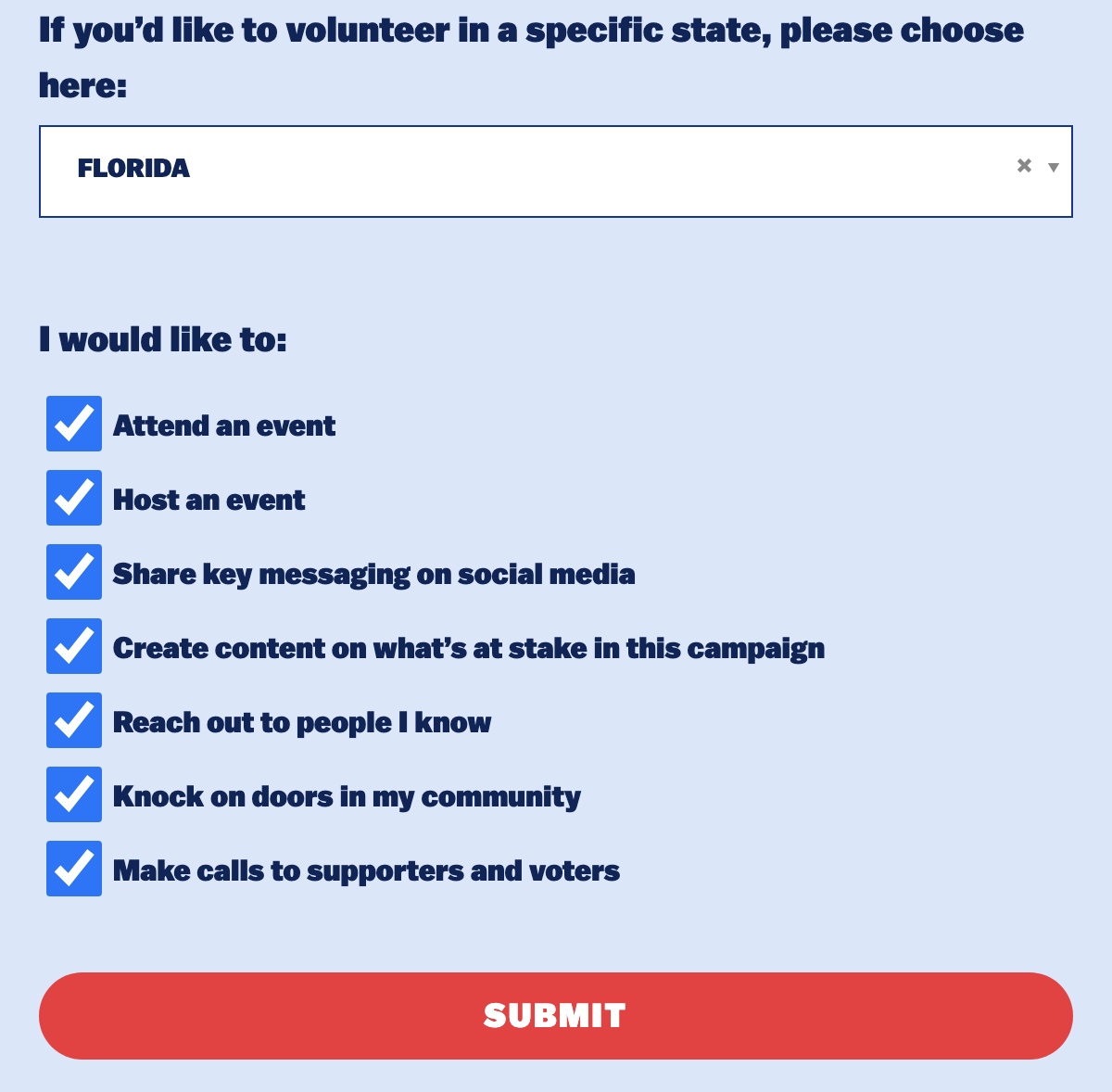This post is subject to the customer agreement.
what used to be news is all vibes now.
 Screenshot of headlines: The $12,000 Harvard Class Celebrities Are Fighting to Get Into I Was at "White Dudes for Harris." I Was Surprised How It Made Me Feel. OpenAl's brain drain isn't a great look for Sam Altman The Power of Oddball Charm Elon Musk Told Advertisers to "Go F— Yourself." Now He's Mad They… The Most Gruesome 4.75 Seconds at the Olympics
Screenshot of headlines: The $12,000 Harvard Class Celebrities Are Fighting to Get Into I Was at "White Dudes for Harris." I Was Surprised How It Made Me Feel. OpenAl's brain drain isn't a great look for Sam Altman The Power of Oddball Charm Elon Musk Told Advertisers to "Go F— Yourself." Now He's Mad They… The Most Gruesome 4.75 Seconds at the Olympics
imagine a world in which JD Vance could appropriate the couch meme, make his own knowing, good natured, self mocking references to couches.
everyone knows the allegation is fabricated, that Vance in fact has nothing on this score to be ashamed of. one thing Harris + Wolz on a stage together demonstrate is how thirsty we all our for human beings just having a little fun, expressing a little joy.
@realcaseyrollins@social.teci.world @realcaseyrollins@noauthority.social I think Walz is the right choice from an electoral perspective because he is great. It’s not about ticking boxes, balance, who’s running as a progressive. I think he has strong values that he has real talent at communicating, and that those values are in fact widely shared, much as people like to slice and dice the electorate into little categories.
 Screenshot of tweet by Dante Atkins: So many people out there saying "Walz helps with this demo or doesn't help with that demo" and no it's not about any of that. Walz forms a sharp contrast of culture, values, morals and biography with the GOP ticket, and knows how to speak about it. That's it. It's all narrative.
Screenshot of tweet by Dante Atkins: So many people out there saying "Walz helps with this demo or doesn't help with that demo" and no it's not about any of that. Walz forms a sharp contrast of culture, values, morals and biography with the GOP ticket, and knows how to speak about it. That's it. It's all narrative.
“At one point in his interview, Mr. Walz volunteered that he had never previously used a teleprompter” https://www.nytimes.com/2024/08/06/us/politics/harris-tim-walz-vp-pick.html?smid=nytcore-ios-share&referringSource=articleShare&sgrp=c-cb
i can’t remember whether i read the movie or watched the book.
FTC’s Lina Khan and DOJ’s Jonathan Kanter at the CNBC CEO Council Summit — 6/4/2024 https://www.youtube.com/watch?v=Qp_6fvf3Lzw
sometimes i think “Yahya and Bibi” must be the highest rated variety show in hell.
@realcaseyrollins Walz is not an identitarian activist or associated with the unpopular excesses of “wokeness”. The kind of (mild) economic populism he’s helped shepherd in Minnesota are broadly popular, across party lines. So much that Trump and Vance sometimes pretend to embrace them. If you are getting your information about Walz from MAGAists portraying him as “hard left” or whatever, you are only deceiving yourself in ways that the broader electorate is unlikely to be deceived.
Harris and Walz together make a good new America foundation.
A Kamala/Walz ticket is one I can get fully behind, not just as a bulwark against fascism but as a vehicle for social-democratic change.
(I was already very Kamala-amped, but the Walz choice helped ease my fears that she might be too close to Obama-esque, neolib-lite "moderates".)
I've made a new donation, and signed up to volunteer. https://web.kamalaharris.com/forms/take-action-for-kamala-harris/
Adobe.
"Currently, you cannot stop your plan from renewing automatically. To turn off automatic renewal, you will need to cancel your membership."
You have 14 days to cancel for free at initial purchase. But when they autorenew, even at a new, high price, an early termination fee applies immediately. Hundreds of dollars if your plan was annual.
Get a human on the phone, demand to cancel, whine, and they'll give you a decent deal.
To end the abuse, set a reminder to cancel in the last month.
 Screenshot from Adobe website, URL https://helpx.adobe.com/manage-account/using/manage-auto-renewal-settings.html Text: When does my plan renew? Annual plan Your membership automatically renews each year on your annual subscription date until you cancel it. We will notify you as your 12-month renewal date is approaching and will advise you about any changes that may take effect. Month-to-month plan You'll be charged the rate stated at the time of purchase, every month, until you cancel. Your monthly rate is subject to change, but we'll always notify you beforehand. Can | stop my plan from renewing automatically? Currently, you cannot stop your plan from renewing automatically. To turn off automatic renewal, you will need to cancel your membership. Learn how to cancel your membership.
Screenshot from Adobe website, URL https://helpx.adobe.com/manage-account/using/manage-auto-renewal-settings.html Text: When does my plan renew? Annual plan Your membership automatically renews each year on your annual subscription date until you cancel it. We will notify you as your 12-month renewal date is approaching and will advise you about any changes that may take effect. Month-to-month plan You'll be charged the rate stated at the time of purchase, every month, until you cancel. Your monthly rate is subject to change, but we'll always notify you beforehand. Can | stop my plan from renewing automatically? Currently, you cannot stop your plan from renewing automatically. To turn off automatic renewal, you will need to cancel your membership. Learn how to cancel your membership.
I am very excited that Kamala Harris has chosen Tim Walz.
q. what do the most considerate lovers say just after you climax?
a. please come again!
@marick @BenRossTransit @Alon @richard_merren @scott (off topic, but i love how you footnote your posts, even though i’m not entirely sure how you footnote your posts.)
“Google is a monopolist, and it has acted as one to maintain its monopoly.” via #DavidMcCabe https://www.nytimes.com/2024/08/05/technology/google-antitrust-ruling.html
from "The Case for Pragmatic Socialism" by @ryanlcooper https://prospect.org/politics/2024-08-05-case-for-pragmatic-socialism/
 Text: The first thing is to help rebuild the union movement. The National Labor Relations Act should be overhauled to require sectoral bargaining, meaning union contracts will be negotiated on an industry-wide basis rather than at each individual shop, and the resulting contract will be extended to every firm regardless of union membership. Stiff penalties will be levied on employers who refuse to negotiate. Second, build a proper welfare state. This will provide an income source to all categories of nonworkers mentioned above, and equalize incomes between households with different numbers of nonworkers. Welfare programs for each category of nonworker—a child allowance, disability and unemployment benefits, a pension for the elderly— will virtually eradicate poverty. Medicare for All will ensure universal health care, and paid family leave, a child allowance, and public day care will enable citizens to have whatever size of family they want. U.S. policymakers are obsessed with means-testing the welfare state, to prevent anyone deemed undeserving from qualifying. But you can just as easily ensure that with stiff and progressive taxation, particularly on the rich. The point is to raise revenue from the broad population to fund the welfare state, while also legally prohibiting the accumulation of vast wealth. Third, rebuild the regulatory state... (truncated due to character limit)
Text: The first thing is to help rebuild the union movement. The National Labor Relations Act should be overhauled to require sectoral bargaining, meaning union contracts will be negotiated on an industry-wide basis rather than at each individual shop, and the resulting contract will be extended to every firm regardless of union membership. Stiff penalties will be levied on employers who refuse to negotiate. Second, build a proper welfare state. This will provide an income source to all categories of nonworkers mentioned above, and equalize incomes between households with different numbers of nonworkers. Welfare programs for each category of nonworker—a child allowance, disability and unemployment benefits, a pension for the elderly— will virtually eradicate poverty. Medicare for All will ensure universal health care, and paid family leave, a child allowance, and public day care will enable citizens to have whatever size of family they want. U.S. policymakers are obsessed with means-testing the welfare state, to prevent anyone deemed undeserving from qualifying. But you can just as easily ensure that with stiff and progressive taxation, particularly on the rich. The point is to raise revenue from the broad population to fund the welfare state, while also legally prohibiting the accumulation of vast wealth. Third, rebuild the regulatory state... (truncated due to character limit)
Should be read in the context of Trump v. United States.
From #JohnGanz, interviewed by #IsaacChotiner https://www.newyorker.com/news/q-and-a/the-american-election-that-set-the-stage-for-trump ht @ryanlcooper
 Text: Some people would argue that Trump actually does work within the system—that he broadly pursues Republican policies and governs like a Republican. I don’'t happen to agree with this, and I don’t think you do, either. People have a very cartoonish understanding of what happens in dictatorships or what happens during fascist seizures of power. For many years, Mussolini ruled in a constitutional context. He was doing illegal and coercive things, but he did not get rid of the constitution. There were elections, even if they were not exactly on the up-and-up. So there’s always a hybridization of conventional politics and this sort of stuff. Mussolini had to be appointed Prime Minister through constitutional means, as did Hitler They both had allies, coalition allies, that were not in their party. Because of the dramatic endings to all these stories, it’s forgotten that there are often prosaic beginnings, during which these political actors make the same sorts of adjustments and alliances and compromises that you see in other forms of politics. They’re just more willing to push and break things when they don’t go their way. Of course, Trump did not successfully break the constitutional system last time around.
Text: Some people would argue that Trump actually does work within the system—that he broadly pursues Republican policies and governs like a Republican. I don’'t happen to agree with this, and I don’t think you do, either. People have a very cartoonish understanding of what happens in dictatorships or what happens during fascist seizures of power. For many years, Mussolini ruled in a constitutional context. He was doing illegal and coercive things, but he did not get rid of the constitution. There were elections, even if they were not exactly on the up-and-up. So there’s always a hybridization of conventional politics and this sort of stuff. Mussolini had to be appointed Prime Minister through constitutional means, as did Hitler They both had allies, coalition allies, that were not in their party. Because of the dramatic endings to all these stories, it’s forgotten that there are often prosaic beginnings, during which these political actors make the same sorts of adjustments and alliances and compromises that you see in other forms of politics. They’re just more willing to push and break things when they don’t go their way. Of course, Trump did not successfully break the constitutional system last time around.
it would be the ultimate troll of everybody if the VP pick was Rachel Dolezal.
@Alon (it's a UNIX geek dad joke, "cron" is the most common tool for automating tasks that should be run on a set schedule. at the scheduled time, the cron job is said to be "triggered". i just got a "cron triggered" notification—from wordpress, rather than UNIX-native cron, but same idea—and thought of this ha ha.)
